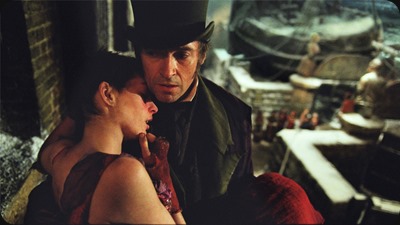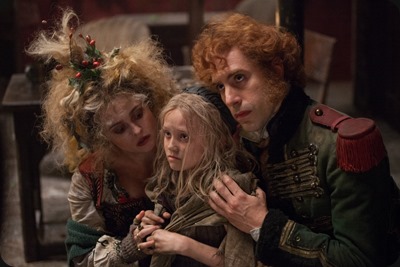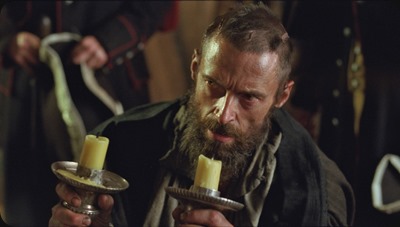This post is the unedited copy of the review published 28 February 2013 at Dawn.com
Entertainment Page Blurb: Tom Hooper’s adaptation of the musical Les Misérables is overly drastic by design.
Agony, Bucket-full of Tears and a Lotta Grime (amidst Close-Up’s)
By Mohammad Kamran Jawaid
The life of a man: scarred by law, saved by Christianity and fatherhood.
In Victor Hugo’s Les Misérables, Jean Valjean, a once thief by starvation and poverty released after nineteen years in jail, gets a new angle on life when his generally despised existence is shown kindness. Fleeing from his parole, Valjean resets his life, only to be hunted down a generation by Javert, a ruthless onetime prison guard turned inspector, to whom he’s forever an inmate with a number.
While Valjean’s life, or the novel’s outcome – or humanity’s agonizing emotional defeat – doesn’t change in director Tom Hooper’s adaptation, its pathos gets a sudden urge to overkill – and that too, with charged relentlessness.
Mr. Hooper, who last directed the Oscar winning The Kings Speech, works from brilliant material (Hugo’s novel, and the long, but expertly condensed musical by Alain Boublil and Claude-Michel Schönberg). However, his dependency to frame either too-wide, or punish his actors with long-takes where they have to lash-out-their lungs singing live (which I personally think is creatively challenging), damages viewership.
The head-to-lip tightness of the frames does indeed amplify the character’s personal anguish, still, the camera angle’s unremitting re-use, coupled with frenzied whiplashing ends up a perpetual discomfort.
When Mr. Hooper isn’t cramping frames, or running wild with the steadicam, he’s busy adding maximalist touches to the scenes (for example: at one point, before Valjean is handed his release papers, we see him hoisting a heavy – and nonsensically large – Cross, as the waves crash in-synch with the film’s overly strong score).
However, these reasons are creative calls that I applaud as well as criticize. What actually knocks down Les Misérables a peg is the “adaptation” itself.
Even with 2 hours and 37 minutes of running time, the adaptation, which nary has dialogues, feels like a “best-of” compilation.
Of course, one understands that there are restrictions, especially because some songs take a lot of screen-time. Often enough, Valjean’s personal journey is weighed under France’s revolution, which bites off a decent chunk of the film’s third act.
Hugh Jackman plays Valjean with earnest misery (at one point, when he sings “Valjean’s Soliloquy”, his face reddens, his temples all-but-burst with the forcefulness of his performance; his “Suddenly” the film’s only original song, is the second best entry of its OST).
Mr. Jackman’s Valjean is somewhat, though not totally, like his character. We feel the build-up, but a solid connection is mislaid somewhere in the interim.
Russell Crowe, playing Javert, is strained – but only because he doesn’t get a stronger placing in the screenplay.
For those who do not know the novel, Valjean, after fleeing the law ends up as a town’s mayor in France. Soon, again on the run from Javert, he ends up with another alias – this time deliberately low-profiled – as a caretaker of a recently orphan girl. She is Cosette, (initially Isabelle Allen and then Amanda Seyfried), a pale beauty with bulging big eyes who is struck down by love at the time of uprising. Her revolutionary romance is Eddie Redmayne, and he’s, of course, smitten as well (though, we don’t feel the burning desire of their romance on-screen).
And finally there’s Fantine played by Anne Hathaway – the films ticking time-bomb that explodes the screen whenever she’s in frame.
Fantine’s initial scene at Valjean’s factory, where she is censured and condemned out of work, isn’t as big a push to her character as it should be. However, when she turns prostitute, and sings “I Dreamed a Dream”, time stops (figuratively speaking, of course). It is a showstopper – a wretched, excruciating, passionate number that sends the listener to a state of shuddering, emotional oblivion.
As Ms. Hathaway sings – her face, grungy and red, her hair chopped down – Mr. Hooper shoots her with a calculated long-take, slightly nudging the camera left, right and center to capture the raw fluctuating scale of her ordeal. To quote Manohla Dargis of the New York Times: “It’s a gusher” – and rightly so, because it is the reason behind Ms. Hathaway’s win at the Oscars this year.
Trying to match Ms. Hathway’s powerhouse performance, Les Misérables stumbles – at times badly.
There are a few emotional releases here and there – especially a grand, showbiz-y turn by Helena Bonham Carter and Sasha Baron Cohen as a pair of hoodwinking innkeepers – but they are too far and wide to actually stop Mr. Hooper’s overbearing influence on a material, which by self, is heavy on the heart. Too much drama, and cramped spaces, is liable to make people uncomfortable.
The film stars: Hugh Jackman, Russell Crowe, Anne Hathaway, Amanda Seyfried, Eddie Redmayne, Samantha Barks (in a brilliantly underplayed performance), Sacha Baron Cohen and Helena Bonham Carter.
Directed by Tom Hooper. Written by William Nicholson, Alain Boublil, Claude-Michel Schönberg and Herbert Kretzmer – based on the novel by Victor Hugo and the stage musical by Mr. Boublil and Mr. Schönberg. The Music is by Mr. Schönberg with lyrics by Mr. Kretzmer. With: Cinematography of Danny Cohen, Edits by Melanie Ann Oliver and Chris Dickens, Production Design by Eve Stewart and Paco Delgado’s Costumes. Produced by Tim Bevan, Eric Fellner, Debra Hayward and Cameron Mackintosh.
Released by Universal Pictures, Les Misérables is rated PG-13. There are guns, poverty, deaths (especially of a young lad) and healthy touch-up of grime.





Fine review Kamran. A valiant effort to create a more authentic approach to the musical genre, Tom Hooper’s Les Misérables is often far too self-serious and humorless for its own good and not all of the actors can sing well, but the performances of Hugh Jackman and Anne Hathaway make up for some of the flaws.
Thank you 🙂